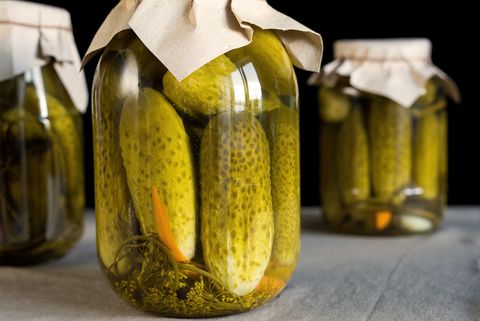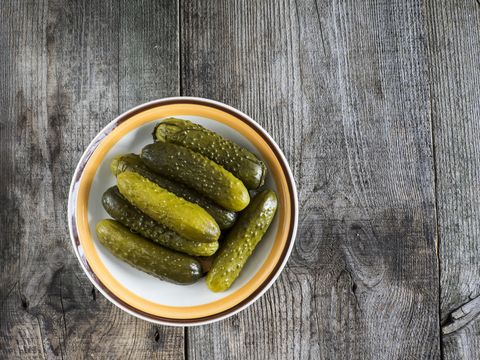
If you think of pickle juice as a beverage at all, it’s probably only as an alcohol chaser. But some people swear that there’s a good reason to chug the briny liquid at the bottom of your pickle jar: it can help reduce muscle cramps and expedite your post-workout recovery.
Does taking shots of warm pickle juice at the gym sound appetizing? Not really, nope. So we decided to call up a few experts and find out whether there’s any truth to the rumor.
Getty ImagesIgorGolovnov
What is actually in pickle juice?
First off, pickle juice is basically just salt. “Pickling is a method of preserving cucumbers in water and salt over time. The juice that remains is a mixture of water, salt and cucumber juice,” Natalie Rizzo, MS, RD told MensHealth.com.
How does pickle juice work for recovery?
“During intense activity (usually lasting longer than an hour) or working out in extremely hot conditions, an athlete will sweat a lot and lose electrolytes (sodium and potassium) in their sweat,” says Rizzo.
To not lose steam and to keep up performance, you need to replace those electrolytes and stay hydrated. So after, say, sweating it out during a brutal CrossFit circuit, you may want something with a salty kick.
Because it’s so salty, pickle juice contains a ton of sodium, as well as smaller amounts of postassium and magnesium, explains Elizabeth Ann Shaw, MS, RDN, CLT, CPT. Replenishing these electrolytes can perk you up when you’re feeling fatigued and rehydrate you quickly.
Are there any other benefits to drinking pickle juice?
There’s also some evidence
Beyond that, pickle juice may also help to improve digestion. “The pickling (aka fermenting) process creates live cultures (probiotics) in the juice, so the juice may be good for gut health,” Shaw says.
I’d rather not straight-up chug pickle juice. Are there any other ways to take it?
You can cook with pickle juice to benefit from its effects. Shaw recommends using one-third of a cup of pickle juice while browning meat: “Since my family is a big fan of the spicy pickles, I’ve found the liquid in the empty jar serves as an excellent flavor enhancer when I’m browning my lean turkey or pork for tacos and chili,” says Shaw. And because the flavor is so strong, there’s no need to add other herbs or seasonings.
You can also use pickle juice as a marinade for beef or pork. “Marinate a piece of meat with as much pickle juice as needed to coat the meat,” says Rizzo. Keep it in the fridge for 1-3 hours or so for it to sit. Shaw recommends using it to make tacos or Sloppy Joe-style sandwiches, or subbing in pickle juice for apple cider vinegar in this delicious short ribs recipe.
You can also use that pickle juice to make even more pickled veggies, such as shredded cabbage, carrots, or radishes, or as a way to make poached eggs, says Dana Angelo White, MS RD. . “Usually, you poach an egg in boiling water with 1 tablespoon of vinegar,” she says. Instead of the vinegar, use pickle juice. It gives the egg a savory, salty edge that will really wake you up in the AM.
And of course, if you’re really into pickles, you can also use pickle juice to make even more pickles: “Throw some sliced cucumbers into the pickle juice and marinate overnight. They will become pickles before you know it,” says Rizzo.
Source: Read Full Article
